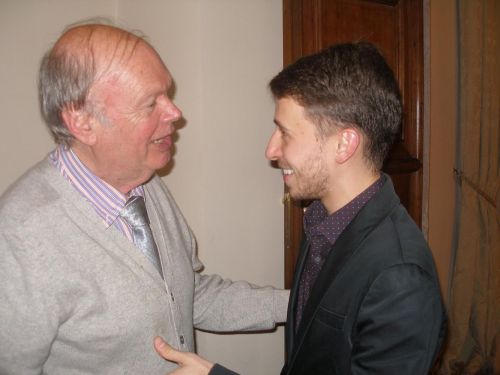 Italy Mozart, Schumann, Villa-Lobos, Oswald, Chopin Pablo Rossi (piano). Sala Palestrina, Palazzo Pamphilj, Brazilian Embassy, Rome. 30.10.2014 (JB)
Italy Mozart, Schumann, Villa-Lobos, Oswald, Chopin Pablo Rossi (piano). Sala Palestrina, Palazzo Pamphilj, Brazilian Embassy, Rome. 30.10.2014 (JB)

If you were to meet Pablo Rossi at a party –bright, perky, ironic, mischievous- you would say that he ought to be playing Puck in Shakespeare’s poetic-fantasy, A Midsummer Night’s Dream. Well he is. But not in a theatre. But on a piano. When I told him after the concert that my ears had been astonished and delighted by his serving up with chillie pepper some Chopin pieces, he was first puzzled, but then pleased, and replied, Of course. I’m Brazilian after all! We were in the Rome Brazilian Embassy. See photo.
I’ve been following this young pianist’s career for the best part of a decade. It’s taken him until now to find his pianistic voice. But find it he certainly has. And his pianism is unique. It comes from the very depths of this playful mischief-maker. He has now learned to have confidence in his innermost voice. And more importantly, how to give voice and pleasure through it. I could never have guessed there could be such fun in some of the Chopin studies he played. He has played these studies before but without the all-important fun which makes them his. Or was there ever such entertaining sly irony as in his polonaise brillante op 22. Like all the best comedians, he tells the joke with a straight face. Enthralling! The build-up through the andante spinato is solemn in contrast, making the “joke” all the more delightful when it comes. Who said Chopin was pompous? Not in Pablo Rossi’s telling of the tale.
The other major composer in the programme was Schumann with his Second Sonata in G minor, op 22. Here the Rossi fingers blazed through Schumann’s romantic melodrama like a torchlight procession: a perfect dispatching of pianistic colour, bold and subtle, expected and unexpected. His sense of musical direction is exceptional. And you certainly need to be a musical geographer to take an audience through the Schumann jungle. It was clear here that Rossi has absorbed much from his four year course at the Moscow Conservatory with the finest of all Schumann performers and teachers, Elissò Virsaladze.
The Rossi irony must be catching. I really would have liked to have asked Mozart why he bothered writing the F major variations on Salve tu Domine. This trash opened the programme. But even Pablo Rossi’s sense of humour couldn’t save it. The wastepaper basket is the only place for this junk.
The recital was presented in the Sala Palestrina of the Palazzo Pamphilj which was the music room of the Doria Pamphilj family before it was sold to the Brazilian Embassy. The Brazilian composers represented were two: Villa-Lobos with five miniatures, each with its own charm. And charm is another Rossi speciality. The other four brief pieces by Henrique Oswald (1852 – 1931) are best forgotten about. Which is exactly what Pablo Rossi did. But at the end of the recital, the Ambassador, who had spoken at some length about this unknown composer as an introduction to the evening, at the end of the concert, said he had still not heard the pieces. Pablo duly dashed them off as an encore.
Jack Buckley
